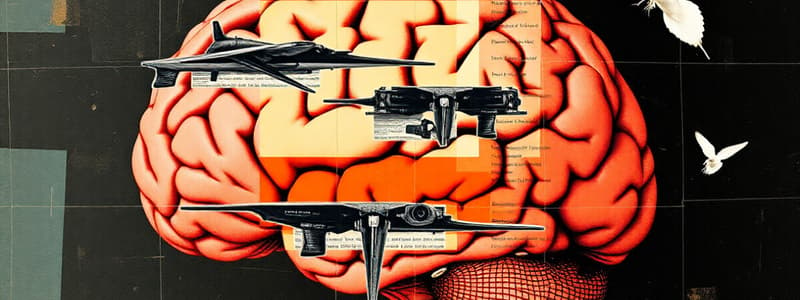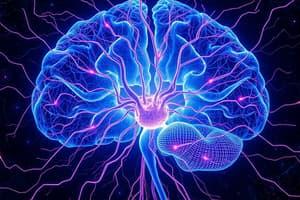Podcast
Questions and Answers
Which brain region is responsible for the regulation of bodily functions such as temperature, rhythms, and blood pressure?
Which brain region is responsible for the regulation of bodily functions such as temperature, rhythms, and blood pressure?
- Amygdala
- Hippocampus
- Thalamus
- Hypothalamus (correct)
What is the primary role of the corpus callosum?
What is the primary role of the corpus callosum?
- Controlling movement and balance
- Connecting the two hemispheres of the brain (correct)
- Forming new memories
- Processing auditory information
Which of these techniques uses a powerful magnetic field to produce detailed images of the brain structure?
Which of these techniques uses a powerful magnetic field to produce detailed images of the brain structure?
- Transcranial Magnetic Stimulation (TMS)
- Positron Emission Tomography (PET)
- Magnetic Resonance Imaging (MRI) (correct)
- Electroencephalography (EEG)
The occipital lobe is primarily responsible for:
The occipital lobe is primarily responsible for:
Which technique is used to study the brain's electrical activity by placing electrodes on the scalp?
Which technique is used to study the brain's electrical activity by placing electrodes on the scalp?
Which brain region is involved in planning and production of movement?
Which brain region is involved in planning and production of movement?
What does lateralization refer to in the context of the brain?
What does lateralization refer to in the context of the brain?
What is the main difference between habituation and dishabituation?
What is the main difference between habituation and dishabituation?
Which of the following is NOT a major property of classical conditioning?
Which of the following is NOT a major property of classical conditioning?
What does the term 'extinction' refer to in classical conditioning?
What does the term 'extinction' refer to in classical conditioning?
What is the main difference between positive reinforcement and negative reinforcement?
What is the main difference between positive reinforcement and negative reinforcement?
Which of the following best describes the concept of 'shaping' in operant conditioning?
Which of the following best describes the concept of 'shaping' in operant conditioning?
What is the primary focus of observational learning?
What is the primary focus of observational learning?
Which type of reinforcement schedule involves reinforcement after a predictable number of responses?
Which type of reinforcement schedule involves reinforcement after a predictable number of responses?
What is the main phenomenon explained by the 'partial-reinforcement extinction effect'?
What is the main phenomenon explained by the 'partial-reinforcement extinction effect'?
Which type of reinforcement schedule involves reinforcement after an unpredictable passage of time?
Which type of reinforcement schedule involves reinforcement after an unpredictable passage of time?
Which of the following is NOT a characteristic of punishment?
Which of the following is NOT a characteristic of punishment?
What phenomenon describes the tendency to emphasize potential losses over potential gains in decision making?
What phenomenon describes the tendency to emphasize potential losses over potential gains in decision making?
Which heuristic involves making decisions based on how typical an object or event is within a certain category?
Which heuristic involves making decisions based on how typical an object or event is within a certain category?
Which intelligence test is specifically designed for children?
Which intelligence test is specifically designed for children?
What does the paradox of choice refer to?
What does the paradox of choice refer to?
Which combination accurately describes the genetic and environmental influences on intelligence?
Which combination accurately describes the genetic and environmental influences on intelligence?
What is the primary requirement for conditioning to occur?
What is the primary requirement for conditioning to occur?
In operant conditioning, what does the Law of Effect state?
In operant conditioning, what does the Law of Effect state?
Which of the following describes 'shaping' in operant conditioning?
Which of the following describes 'shaping' in operant conditioning?
Which type of reinforcement schedule provides food after an average of 4 responses?
Which type of reinforcement schedule provides food after an average of 4 responses?
What is the effect of partial reinforcement compared to continuous reinforcement?
What is the effect of partial reinforcement compared to continuous reinforcement?
What can lead to learned helplessness in an organism?
What can lead to learned helplessness in an organism?
Which of the following is NOT a characteristic of observational learning?
Which of the following is NOT a characteristic of observational learning?
What is the role of a conditioned stimulus (CS) in classical conditioning?
What is the role of a conditioned stimulus (CS) in classical conditioning?
Which of the following best defines habituation?
Which of the following best defines habituation?
Which type of memory is primarily responsible for our ability to ride a bicycle, even if we haven't done it in years?
Which type of memory is primarily responsible for our ability to ride a bicycle, even if we haven't done it in years?
Which of the following is NOT a type of memory distortion?
Which of the following is NOT a type of memory distortion?
You are trying to remember the name of a famous actor, but you just can't recall it. You remember that he was in a movie with a blue car, but you can't remember the movie's title. What type of memory failure is this an example of?
You are trying to remember the name of a famous actor, but you just can't recall it. You remember that he was in a movie with a blue car, but you can't remember the movie's title. What type of memory failure is this an example of?
Which of the following is the best example of prospective memory?
Which of the following is the best example of prospective memory?
Which type of amnesia involves the inability to form new memories?
Which type of amnesia involves the inability to form new memories?
What is the primary difference between normative and descriptive decision theories?
What is the primary difference between normative and descriptive decision theories?
Which of the following statements accurately describes the concept of 'memory bias'?
Which of the following statements accurately describes the concept of 'memory bias'?
Which of these is NOT a factor that influences the expected utility theory?
Which of these is NOT a factor that influences the expected utility theory?
What is the main difference between analogical and symbolic mental representations?
What is the main difference between analogical and symbolic mental representations?
Which of the following is the best example of a heuristic?
Which of the following is the best example of a heuristic?
Flashcards
Transcranial Magnetic Stimulation (TMS)
Transcranial Magnetic Stimulation (TMS)
A technique using strong magnets to disrupt normal brain activity temporarily.
Electroencephalography (EEG)
Electroencephalography (EEG)
A method to measure electrical activity in the brain by placing electrodes on the scalp.
Positron Emission Tomography (PET)
Positron Emission Tomography (PET)
A brain imaging technique that shows metabolic activity using a radioactive substance.
Functional Magnetic Resonance Imaging (fMRI)
Functional Magnetic Resonance Imaging (fMRI)
Signup and view all the flashcards
Cerebral cortex
Cerebral cortex
Signup and view all the flashcards
Hippocampus
Hippocampus
Signup and view all the flashcards
Lateralization
Lateralization
Signup and view all the flashcards
Conditioning
Conditioning
Signup and view all the flashcards
Contiguity
Contiguity
Signup and view all the flashcards
Contingency
Contingency
Signup and view all the flashcards
Operant Conditioning
Operant Conditioning
Signup and view all the flashcards
Law of Effect
Law of Effect
Signup and view all the flashcards
Reinforcers
Reinforcers
Signup and view all the flashcards
Shaping
Shaping
Signup and view all the flashcards
Partial Reinforcement
Partial Reinforcement
Signup and view all the flashcards
Learned Helplessness
Learned Helplessness
Signup and view all the flashcards
Habituation
Habituation
Signup and view all the flashcards
Dishabituation
Dishabituation
Signup and view all the flashcards
Sensitization
Sensitization
Signup and view all the flashcards
Classical Conditioning
Classical Conditioning
Signup and view all the flashcards
Acquisition
Acquisition
Signup and view all the flashcards
Extinction
Extinction
Signup and view all the flashcards
Positive Reinforcement
Positive Reinforcement
Signup and view all the flashcards
Negative Reinforcement
Negative Reinforcement
Signup and view all the flashcards
Fixed Ratio Schedule
Fixed Ratio Schedule
Signup and view all the flashcards
Episodic Memory
Episodic Memory
Signup and view all the flashcards
Explicit Memory
Explicit Memory
Signup and view all the flashcards
Implicit Memory
Implicit Memory
Signup and view all the flashcards
Procedural Memory
Procedural Memory
Signup and view all the flashcards
Prospective Memory
Prospective Memory
Signup and view all the flashcards
Amnesia
Amnesia
Signup and view all the flashcards
Retrograde Amnesia
Retrograde Amnesia
Signup and view all the flashcards
Anterograde Amnesia
Anterograde Amnesia
Signup and view all the flashcards
Memory Bias
Memory Bias
Signup and view all the flashcards
Heuristics
Heuristics
Signup and view all the flashcards
Heuristic Thinking
Heuristic Thinking
Signup and view all the flashcards
Anchoring
Anchoring
Signup and view all the flashcards
Framing
Framing
Signup and view all the flashcards
Availability Heuristic
Availability Heuristic
Signup and view all the flashcards
Paradox of Choice
Paradox of Choice
Signup and view all the flashcards
Study Notes
General Information
- No specific information provided for summary. Please provide further context.
Studying That Suits You
Use AI to generate personalized quizzes and flashcards to suit your learning preferences.




